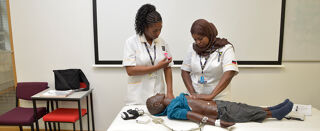Birmingham City University’s collaborative health and research partnership with the Zambian Ministry of Health, Lusaka College of Nursing and Ndola College of Nursing developed a mentorship model and training programme.
The limited number of Registered Critical Care Nurses (less than 150) means that critical care course students who spend 70% of their course in clinical practice, had few role models. The role of the mentor and assessor in practice was developed and enhanced to provide support and role models for students and junior staff.
Project aims
The project involved exploring the role of assessors, mentors and supervisors. It developed and refined a Zambian model for mentorship and implemented this through CPD and train the trainer workshops.
Who completed the project?
UK Project Team:
- Chris Carter
- Professor Joy Notter
Strategic Partner: Ministry of Health, General Nursing Council, Zambia.
Main Zambian Project team:
- Mrs Priscar Sakala Mukonka
- Mrs Lilian Jere Sitwala
- Mr Godwin Mulawisha
Who are we working with?
Zambia
This project was funded by:
- Department for International Development, Health Partnership Scheme
- Johnson & Johnson Africa Grants Programme.
- Tropical Health & Education Trust (THET)
Final outcome
92 Critical Care Nurses and Educators attended train the trainer workshops.
Baseline findings found 77% of participants had no formal training in clinical mentorship, and few could define mentorship or describe their role as a clinical mentor. Nevertheless, self-assessment revealed 31.8% were very confident, with a further 45.4% reporting a degree of confidence. Post-course all participants reported increased levels of confidence in both mentorship and assessment, with 81% reported an increased level of knowledge and understanding from the training.
Research workshops (3) illustrated that 12 months post course they were using the content from the workshop in practice. Clinical nurses had accepted the model of mentorship used in the workshops and the counselling skills as realistic for practice. In consequence, they felt more able to support students a key aspect of mentorship and were confident that they could assess their ability firstly, to work under supervision, secondly, to work autonomously.
Nurse educators found the theory appropriate and were using the model to support and teach their peers. Students received better support from mentors who had been trained and had counselling skills. Educators also had increased confidence in assessments carried out by clinical colleagues.
Consistent themes included assessment strategies, supporting the failing student and the need for all clinical staff to undertake formal mentorship training.
The findings and recommendations from this study have contributed to the national policy development of critical care nurse mentors and assessors. The supported assessment provided by mentorship offers opportunities for students and newly qualified critical care nurses to review their levels of knowledge, skills and attitudes in a supportive environment and meet requisite standards of quality and patient safety.
